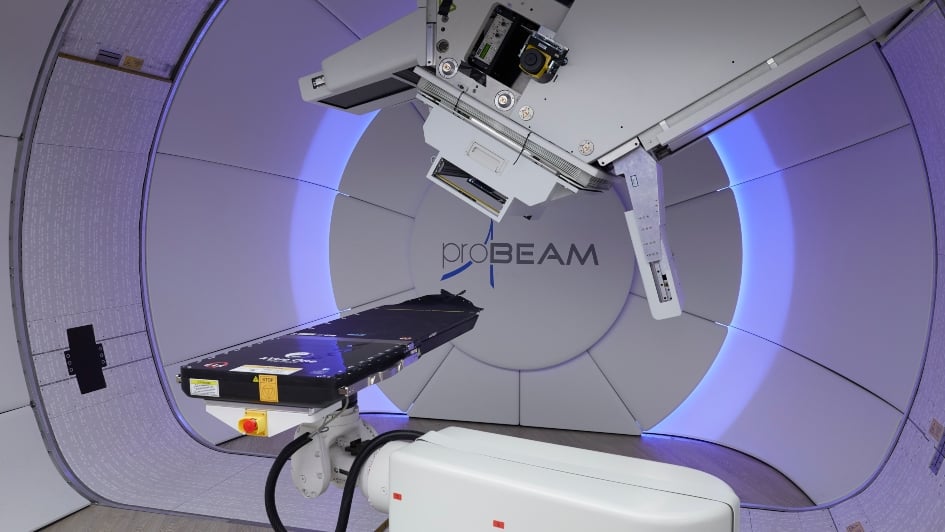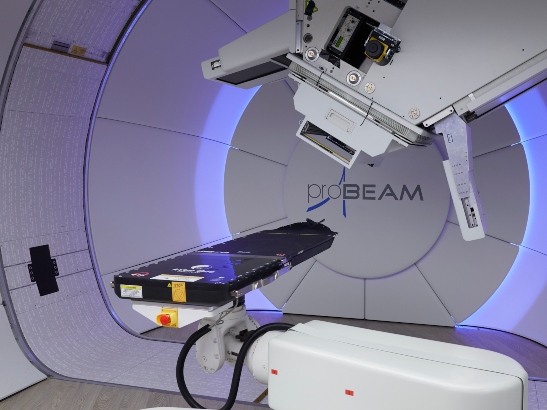
Image: proton beam therapy scanner, credit: The Royal Christie NHS Foundation Trust
The first UK trial to test the benefits of proton beam therapy for certain patients with breast cancer has launched in the UK.
The trial will compare proton beam therapy – which can target radiotherapy beams more precisely – with standard radiotherapy for patients who are at greater risk of long-term heart problems after radiotherapy treatment.
It will help to determine whether proton beam therapy can help to deliver adequate doses of radiotherapy to breast tissue, while minimising off-target radiation delivered to the heart.
The trial will enrol 192 people across a planned 22 sites in the UK. People allocated to receive proton beam therapy will be treated at either The Christie NHS Foundation Trust in Manchester, or University College London Hospitals NHS Foundation Trust with accommodation provided for those who are travelling far from home.
The PARABLE trial is being led by researchers at The University of Cambridge, The Institute of Cancer Research, London, and The Royal Marsden NHS Foundation Trust and managed by the Cancer Research UK-funded Clinical Trials and Statistics Unit at The Institute of Cancer Research (ICR).
PARABLE is funded by a National Institute for Health and Care Research (NIHR) and Medical Research Council (MRC) partnership. The NHS proton centres – UCLH and The Christie – also provided expert guidance on the trial protocol development.
Radiotherapy lowers chance of recurrance
Every year in the UK over 30,000 people with breast cancer receive radiotherapy following surgery as part of their treatment. Standard breast cancer radiotherapy uses high energy x-rays to kill cancer cells. As well as lowering the risk of cancer coming back, radiotherapy can increase survival rates.
Standard breast cancer radiotherapy is very effective for the vast majority of people and the benefits far outweigh small side effects. However, there can be a very small risk of radiotherapy leading to heart problems much later in life (less than one per cent of people treated).
The risk of heart problems later in life due to breast radiotherapy may be higher than one per cent for a very small group of people. This is usually because their breast tissue and the lymph nodes which require radiotherapy treatment are located close to the heart, and/or because they have an increased underlying risk of developing heart problems later in life.
Charged particles instead of x-rays
Proton beam therapy uses charged particles instead of x-rays to target tumours more precisely. Researchers hope it will allow doctors to deliver the required dose of radiotherapy where it’s needed, while minimising the dose of radiation delivered to the heart, and without increasing the risk of early side effects such as skin redness and changes in breast appearance.
The average radiotherapy dose that the heart is likely to receive from the radiotherapy planning scan can be estimated and together with age and other medical history, this information is used to predict the potential small lifetime risk of heart problems.
People who are predicted to have at least a two per cent or more potential lifetime risk of heart problems from radiotherapy will be invited to take part. Around 500 out of every 30,000 people who receive radiotherapy for breast cancer fall into this category. People who enter the trial will either receive standard radiotherapy or proton beam therapy.
The innovative trial will measure radiation dose delivered to the heart as an early predictor of possible heart problems, to avoid the need for lengthy follow up for many years before results are available.
People in the trial will also record their experiences using questionnaires so that researchers can assess side-effects including skin reactions, breast pain and swelling, and other symptoms which are particularly important for patients.
Proton beam therapy has been used in other countries to treat breast cancer, but numbers of participants in these trials are small and there have been no reported trials that directly compare proton beam therapy with standard radiotherapy.
The researchers stress the importance of evaluating the benefits of proton beam therapy – which is expensive and only available in certain locations across the UK – thoroughly in a clinical trial.
Uncover potential benefits
Professor Judith Bliss, Director of the Cancer Research UK-funded Clinical Trials and Statistics Unit at The Institute of Cancer Research, London, which is managing the PARABLE trial, said:
“Radiotherapy is a very effective part of treatment for breast cancer that helps to lower the risk of cancer returning and has been shown to improve survival. However, effectively delivering standard radiotherapy can be difficult when the patient’s breast tissue and lymph nodes are located close to their heart, or they are already at risk of heart problems.
“We’re delighted to launch the PARABLE trial to put proton beam therapy to the test and determine whether it has benefits over standard radiotherapy in a group of people who may need more targeted treatment.
“The PARABLE trial will measure average dose of radiotherapy delivered to the heart to predict long-term heart damage. Using this early predictor will allow us to uncover the potential benefits of using proton beam therapy for long term heart health in years rather than decades.”
Professor Charlotte Coles, Professor of Breast Cancer Clinical Oncology at the University of Cambridge, Consultant Oncologist at Addenbrooke’s Hospital and Chief Investigator of the PARABLE trial, said:
“Although only a very small group of people are affected by a higher risk of heart problems later in life, it can still be a serious issue. Most patients treated with radiotherapy have decades of healthy life ahead of them and we need to do everything we can to avoid possible future heart problems related to treatment.
“Standard breast radiotherapy is really effective for most people with very few side effects, but there is a small group of patients for whom proton beam therapy may be a better option.”
'Personalise radiotherapy treatments'
Dr Anna Kirby, Consultant Clinical Oncologist at the Royal Marsden NHS Foundation Trust, Breast Cancer Radiotherapy Team Lead at The Institute of Cancer Research, London, and Radiotherapy Lead for the PARABLE trial, said:
“It has been a monumental collaborative effort between patient advocates and professionals working in breast cancer radiotherapy research throughout the UK and beyond to develop, secure funding for, and now launch this trial.
“We have already learnt a huge amount about how to optimise and standardise current breast cancer radiotherapy practices alongside optimising proton beam therapy approaches. We hope that the PARABLE trial will help us to further personalise radiotherapy treatments and ensure that people can access the radiotherapy approach that is best for them, regardless of where they live.”
Professor Jonathan Wadsley, National Specialty Lead for Radiotherapy and Imaging at the NIHR, which funded the trial, said:
"The UK is currently leading the way in developing the evidence base to demonstrate when proton beam radiotherapy can provide significant clinical benefit to some patients over conventional radiotherapy.
"It is exciting to see the launch of the first trial aiming to demonstrate the benefit of this treatment for a subset of patients with breast cancer."
'Untapped potential'
Professor David Sebag-Montefiore, former Chair of the National Cancer Research Institute (NCRI) Clinical and Translational Radiotherapy Research Working Group (CTRad) which supported the development of PARABLE, said:
“There is untapped potential in proton beam therapy, potentially reducing the risks of side-effects following cancer treatment. It is critically important that we conduct well-designed clinical trials to determine when proton beam therapy can be beneficial for people with breast cancer. We are really pleased that the groundwork and mentorship provided by CTRad has led to the successful funding of such an important clinical trial.”
.jpg)
Kim Jones, 44, a school caterer from Ely, was diagnosed with breast cancer in February 2022 after noticing some thickening of the skin and painful twinges in her left breast. Her GP referred her for urgent scans at the breast clinic, and after having mammograms, ultrasounds and biopsies, the diagnosis was confirmed.
Kim was then referred to Addenbrookes Hospital in Cambridge, where she had chemotherapy followed by a mastectomy and lymph node removal. Following acceptance to the PARABLE trial, Kim's proton beam therapy commenced at The Christie on 24 October.
'Very lucky to have the opportunity to get this treatment'
Kim said: "I was told I might be suitable to participate in the PARABLE trial as it would potentially benefit patients with a high risk of long-term heart complications. As I already had an issue with my heart, the trial seemed like a great idea.
"When I was told that I'd been accepted onto the trial, I felt very lucky to have the opportunity to get this treatment. Clinical trials are incredibly important as they are the best way to evaluate which treatments work the best."
"The proton beam therapy centre at The Christie is bright and spacious and feels very relaxing. My experience of being treated at Addenbrooke’s and now at The Christie has been superb. The staff are wonderful and seem to have thought of everything. Their care is second to none, and I feel completely safe in their hands."
Following the proton beam therapy, Kim will have further treatment at Addenbrookes.
Kim is married to Mark, and they have two boys, Dylan, age 14, and Elwood, age 11. She enjoys walking, reading, live music and spending time with her family.
